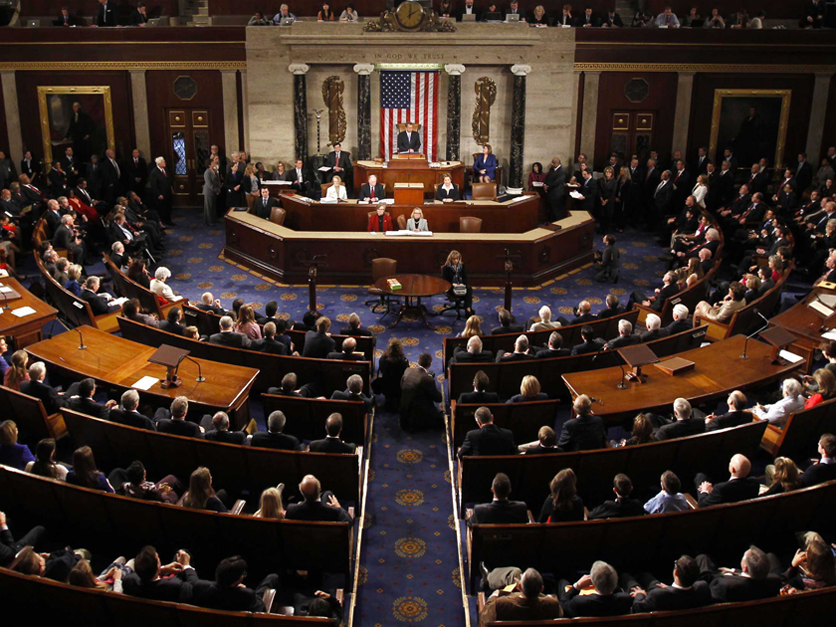The big question in Washington this week is whether House Republicans can hold together to pass their plan to slash $4.5 trillion in federal spending in exchange for raising the debt ceiling.
Republicans control the House by a razor-thin margin, 222-213, and the Limit, Save, Grow Act is highly unlikely to get any Democratic support. The House Democratic whip’s floor schedule for this week, in fact, doesn’t use the bill’s official name. The bill is instead listed as the “Default on our Debt Act.”
The plan would expand SNAP work requirements and repeal the biofuel and clean energy tax incentives that are the centerpiece of President Joe Biden climate policy.
What they’re saying: “I’m worried about how the President is handling the debt ceiling,” House Speaker Kevin McCarthy, R-Calif., said in a tweet this weekend. “By ignoring it, he is walking us in to the first default in our nation’s history. We have a responsibility to act for future generations — before it’s too late.”
But Sen. Amy Klobuchar, D-Minn., said Sunday on CNN’s State of the Union that Republicans are following a risky strategy that could damage the economy.
“The last time when this was in the air, we literally went down in our credit rating back in 2011. What we will see, the repercussions of this are huge, if you go forward as McCarthy wants. What will happen? You will literally see interest rates go up for mortgages, for loans. You're going to see the stock market plummet again,” she said.
For more on the bill and this week’s D.C. agenda, read our Washington Week Ahead.
EPA seeks clarification of appeals court’s WOTUS ruling
The Environmental Protection Agency has asked an appeals court to clarify that its stay of the Biden administration's “waters of the U.S.” rule does not apply nationwide.
In a motion filed Friday, EPA asked the 6th Circuit Court of Appeals to specify that that its relief extends only to the Commonwealth of Kentucky and to the members of business groups including the U.S. Chamber of Commerce, who also sued over the rule.
On Thursday, the court issued an administrative stay of the WOTUS rule, but left the geographic extent undefined while it considers the district court’s denial of an injunction request.
“It is vital that all members of the public know unequivocally which law governs their own conduct,” the government said in its motion, which it said is unopposed by the other parties.
The ruling made Kentucky the 27th state where the WOTUS rule is enjoined. But the list of corporate entities not covered now extends to members of the business groups, even if they are not located in those states.
EPA seeks comments on Clean Water Act pesticide settlement
The Environmental Protection Agency has agreed to evaluate the effects of its Pesticide General Permit on endangered species as part of a settlement with the Center for Biological Diversity.
The so-called PGP covers discharges to waters of the U.S. from chemical treatments to control mosquitoes as well as other flying insects, weeds and algae, animals, and pests in the forest canopy.
EPA has agreed to complete Endangered Species Act consultation with the Fish and Wildlife Service by Oct. 31, 2024 and issue the PGP by Dec. 17 of that year. The permit would become effective in October 2026.
UN stresses healthy trade as key to global food security
Strong global agricultural trade is key to food security, Qu Dongyu, director general of the United Nations Food and Agriculture Organization, told the G7 summit of agriculture ministers in Japan this weekend. Qu thanked the Japanese government in particular for helping finance the Agricultural Market Information System, or AMIS, which the UN credits with contributing to “well-functioning markets and market transparency.”
Don’t miss a beat! It’s easy to sign up for a FREE month of Agri-Pulse news! For the latest on what’s happening in Washington, D.C. and around the country in agriculture, just click here.
Global grain prices have largely dropped below the spikes caused by the Russian invasion of Ukraine, and that’s largely due to the Black Sea Grain Initiative, a United Nations-led pact that reopened Ukraine’s ability to export millions of tons of graine from its Odesa ports, says AMIS.
“Yet, while prices have fallen in international markets, they have frequently remained high at (the) local level, particularly in net food importing developing countries reflecting the weakening of their currencies against the U.S. dollar,” according to AMIS. “As a result, food price inflation is still a serious concern in many countries, also because post-farm gate costs for shipping and processing remain subject to inflationary pressures.”
Take note: U.S. Agriculture Secretary Tom Vilsack participated in the G7 summit, where he tweeted: “It’s an honor to take part in the #G7 Agriculture Ministers’ Meeting in Japan as we rally across the globe to address food security needs and call attention to the interrelationship among food security, climate, sustainable productivity growth, innovation, and trade.”
Questions, comments, tips? Email bill@agri-pulse.com




